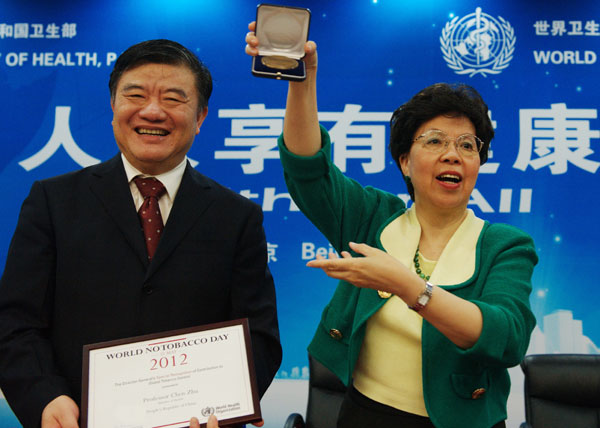WHO urges China to tax smokers
Updated: 2012-07-19 03:23
By Shan Juan and Wang Qingyun (China Daily)
|
|||||||||||
Cigarette tax should be increased to combat nicotine addiction in the world's largest tobacco consumer and producer, the World Health Organization chief said.
WHO Director-General Margaret Chan called for more taxes on Wednesday after awarding Health Minister Chen Zhu a certificate in recognition of his efforts to combat smoking.
 |
|
World Health Organization Director-General Margaret Chan (right) gives the certificate and medal of the Director-General's Special Recognition of Contribution to Global Tobacco Control to Chen Zhu, the minister of health, in Beijing on Wednesday. Wei Xiaohao / China Daily |
"There is still plenty of room for China to raise its tobacco tax and the government should take more action regarding this to help curb smoking," she told China Daily.
"Evidence shows that higher taxes deter people, especially the young, from smoking,'' she said.
International studies indicate that for every 1 percent rise in the price of a packet of cigarettes, the number of smokers falls by about 0.4 percent, she said.
"Every time I have come to China and had the opportunity of speaking to Chinese leaders, I encouraged them to raise tobacco tax," she added.
There is a huge financial cost in treating tobacco-related diseases, Chan said.
China has 350 million smokers, more than one-third of the world's total, and at least 1 million people die from smoking-related diseases each year, according to the ministry. By 2020, the figure for fatalities is expected to reach 2 million without effective intervention.
Government agencies, like the ministries of health and education, have introduced policies such as smoke-free hospitals and schools, as well as smoking bans at most public indoor places. Tobacco products have also been targeted with tax hikes.
In 2009, authorities increased tobacco tax by at least 6 percent, mostly on the more expensive brands.
"But that had little effect on curbing tobacco use, particularly the low-end brands," said Yang Gonghuan, former director of the tobacco control office under the Chinese Center for Disease Control and Prevention.
Tobacco tax, even after the hike, remained very low on a global scale.
"Countries are looking at how to increase tobacco tax and China should also raise the tax according to its own circumstances," Chan said.
China signed the WHO Framework Convention on Tobacco Control and ratified it in 2005.
The campaign to combat nicotine addiction falls under the Ministry of Industry and Information Technology, which also oversees the State Tobacco Monopoly Bureau, often referred to as the China National Tobacco Corp.
Chan suggested that implementation of the WHO framework should be led by the Ministry of Health instead.
"I would confer an award to the Ministry of Industry and Information Technology to encourage them," she said.
Vice-Premier Li Keqiang also met Chan in Beijing on Wednesday.
Li congratulated Chan on her second term as director-general of WHO, which was announced in May.
Chan spoke highly of China's progress in medical reform, which, among other things, saw medical insurance coverage rise from 30 percent to 95 percent for residents in the past five years.
Contact the writers at shanjuan@chinadaily.com.cn and wangqingyun@chinadaily.com.cn
Related Stories
It is time for our government to quit 'smoking' 2012-05-31 15:29
Most of world exposed to deadly tobacco smoke: WHO 2009-12-10 09:03
Smoking may kill 30% of China's middle-aged men by 2030 2007-04-25 09:53
Smoke break gets more expensive with tax boost 2009-03-30 14:13
Today's Top News
President Xi confident in recovery from quake
H7N9 update: 104 cases, 21 deaths
Telecom workers restore links
Coal mine blast kills 18 in Jilin
Intl scholarship puts China on the map
More bird flu patients discharged
Gold loses sheen, but still a safe bet
US 'turns blind eye to human rights'
Hot Topics
Lunar probe , China growth forecasts, Emission rules get tougher, China seen through 'colored lens', International board,
Editor's Picks

|

|

|

|

|

|





